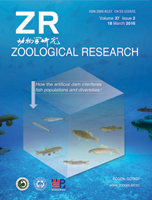
|
Zoological Research
Kunming Institute of Zoology, Chinese Academy of Sciences
ISSN: 2095-8137
Vol. 38, No. 4, 2017, pp. 180-190
|
 Bioline Code: zr17023
Bioline Code: zr17023
Full paper language: English
Document type: Research Article
Document available free of charge
|
|
|
Zoological Research, Vol. 38, No. 4, 2017, pp. 180-190
| en |
Establishment of basal cell carcinoma animal model in Chinese tree shrew ( Tupaia belangeri chinensis  ) )
Jiang, Li-Ping; Shen, Qiu-Shuo; Yang, Cui-Ping & Chen, Yong-Bin
Abstract
Basal cell carcinoma (BCC) is the most common skin cancer worldwide, with incidence rates continuing to increase. Ultraviolet radiation is the major environmental risk factor and dysregulation of the Hedgehog (Hh) signaling pathway has been identified in most BCCs. The treatment of locally advanced and metastatic BBCs is still a challenge and requires a better animal model than the widely used rodents for drug development and testing. Chinese tree shrews (Tupaia belangeri chinensis) are closely related to primates, bearing many physiological and biochemical advantages over rodents for characterizing human diseases. Here, we successfully established a Chinese tree shrew BCC model by infecting tail skins with lentiviral SmoA1, an active form of Smoothened (Smo) used to constitutively activate the Hh signaling pathway. The pathological characteristics were verified by immunohistochemical analysis. Interestingly, BCC progress was greatly enhanced by the combined usage of lentiviral SmoA1 and shRNA targeting Chinese tree shrew p53. This work provides a useful animal model for further BCC studies and future drug discoveries.
Keywords
Chinese tree shrew; Basal cell carcinoma; Hedgehog
|
| |
© Copyright 2017 - Zoological Research
Alternative site location: http://www.zoores.ac.cn/
|
|
